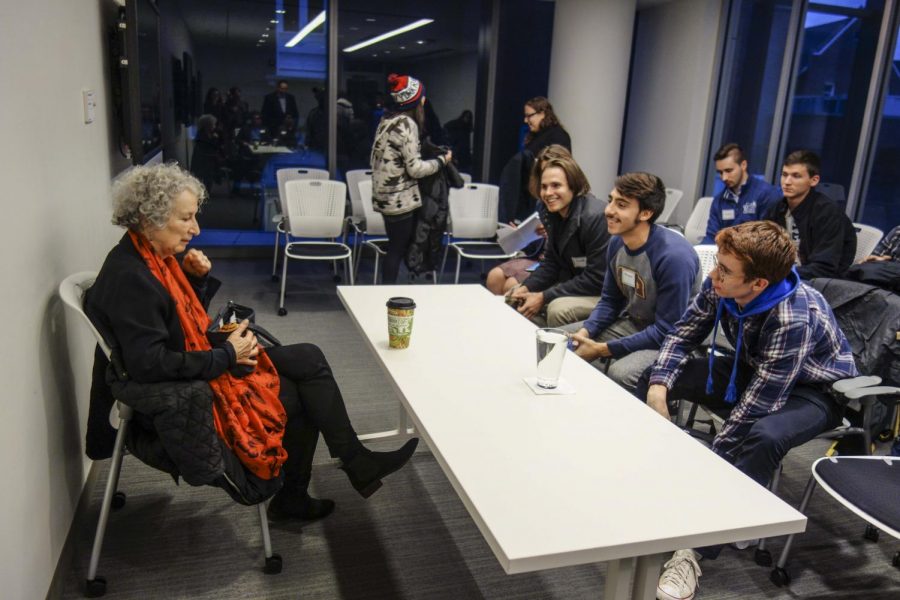Margaret Atwood speaks in sold-out Writers Center Stage
Atwood discussed her childhood and the experiences that impacted her early years when she visited CWRU earlier this month.
The William N. Skirball Writers Center Stage wrapped up its winter season with a discussion by “The Handmaid’s Tale” author, political activist and literary critic Margaret Atwood. Before the sold-out event, Atwood met with students on campus to discuss her work, life and just about everything in between.
Atwood was raised in Ottawa, Ontario, Canada in a small home in the woods with her scientist father, her mother and two siblings. She said that growing up, her family did not have electricity or running water, and that “…reading, writing, and drawing by candlelight were all we had.”
Inspired by her exploration of back-country, at the age of six, Atwood began writing plays and poems, most of which had dark themes. She cited the Brothers Grimm, Beatrix Potter and George Orwell as some of her earliest influences.
“I read Orwell’s ‘Animal Farm’ when I was nine, and I think it scared my mother; she thought books like that would warp her children,” she said. “She was right.”
Indeed, the accuracy of her dystopian novels haunt the 78-year-old’s readers today. “The Handmaid’s Tale” is about a totalitarian society that honors “traditional values,” where women’s freedoms are completely restricted. English professor Thrity Umrigar, who introduced Atwood at the event, quoted “Cruel Beautiful World” author Caroline Leavitt, who said, “‘[Atwood] made me want to be scared of my own writing.’”
In pursuit of her literary career, the novelist studied English, philosophy and French at the University of Toronto’s Victoria College, and obtained higher education at Radcliffe College and Harvard University. Atwood’s passion for learning and education led her to hold multiple teaching positions throughout her career.
“I loved teaching both undergraduate students and graduate students [the same novel] at the same time because they always had such different interpretations of its themes,” Atwood said. “When you read the same thing at different points in your life, you’re a different person with different experiences. If you don’t connect with something right when you read it, that doesn’t mean you won’t connect with it later in life.”
The five-time Man Booker Prize for Fiction (Booker Prize) nominee is extremely well-read herself, with an affinity for just about every subject. She said that she enjoys reading about the places she visits and that the last thing she read was called “Haunted Tuscaloosa,” which she picked up while traveling.
Atwood has included a great amount of traveling in her schedule after the widely successful release of “The Handmaid’s Tale” on Hulu. Her recent agenda included attending the Emmys, where the on-screen adaptation of her novel won the award for Outstanding Drama Series.
“I felt especially short that night,” she joked, “and I saw a lot of fashion. Most of the women were wearing high heels and looked more willowy than ever, but I had none of that. I was just short.”
As for the future, Atwood hopes her work will continue to bring attention to social and political issues.
She said, “You can’t predict how people will respond to your work, but you can hope that if they don’t connect with it now, they’ll connect with it later.”
Atwood was the last Writers Center Stage speaker of 2017, but the series will continue at the Maltz Performing Arts Center on Tuesday, March 20, 2018 with “Where’d You Go, Bernadette” author Maria Semple.


